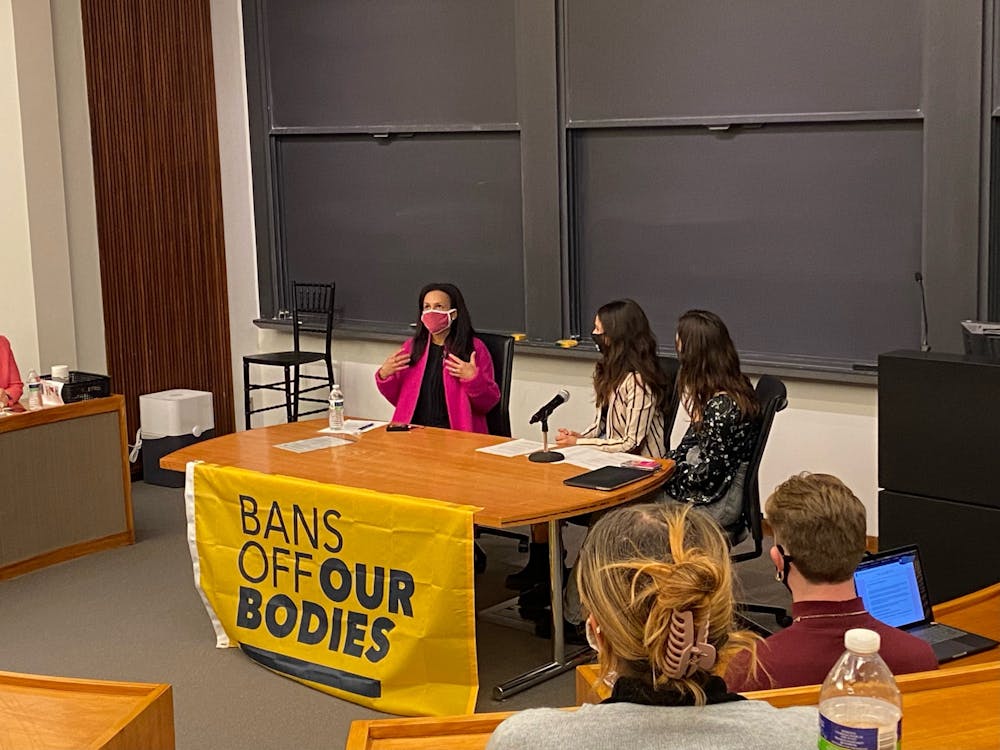Planned Parenthood CEO Alexis McGill Johnson ’93 came to campus last week to discuss a recent wave of abortion restrictions and her goals for pro-choice activism moving forward.
Princeton Students for Reproductive Justice (PSRJ) hosted a discussion on Dec. 9 with Johnson, who serves as the CEO of the Planned Parenthood Federation of America (PPFA) and the Planned Parenthood Action Fund (PPAF). During the talk, Johnson discussed memories of her time at the University and the status of reproductive rights in the United States. Johnson served as a board member for PPFA for over a decade before becoming the CEO of the organization in 2019.
The discussion was facilitated by PSRJ members Maia Harrison ’24 and Allie Matthias ’24.
PSRJ is a student organization dedicated to raising awareness about reproductive health and rights. The group also seeks to collaborate with pro-choice state, national, and international organizations.
Johnson began the talk by discussing her Princeton experience and how it shaped her career. She described her early activism as a student. In the aftermath of the Rodney King verdict in 1992, Johnson recalled “advocating for more faculty of color, advocating for Black American studies, and advocating for ourselves as students and the critical needs that we needed to learn.”
Johnson also spoke about her concerns about newly adopted laws that restrict abortion access. She focused primarily on the issues surrounding the adoption of Texas SB-8 and the Supreme Court case Dobbs v. Jackson Women’s Health Organization, in which the court heard oral arguments last week.
SB-8, also known as the “heartbeat bill,” is a recent Texas abortion law. The law is currently one of the most stringent abortion bans in the country, prohibiting abortions in the state after a fetal heartbeat is detected and encouraging private citizens to enforce the law by offering a $10,000 reward for reporting another person who aids someone in obtaining an illegal abortion.
In Mississippi, the Gestational Age Act, passed in 2018, bans abortions after 15 weeks. Dobbs v. Jackson Women’s Health Organization challenges its constitutionality. After listening to last week’s oral arguments on the case, Johnson said she felt disheartened.
“I found the arguments not particularly surprising but shocking,” she said. “There were six justices who thought the 15 week ban was reasonable and five justices who felt comfortable talking openly about overturning Roe [v. Wade].”
Johnson argued that Roe v. Wade, the 1973 Supreme Court decision that established the constitutional right to an abortion, is important not only in ensuring abortion access, but also because of other freedoms that have become associated with it, including the right to contraception.
“If Roe is hanging on by a thread, this case could unravel the whole sweater of a lot of other rights,” Johnson said.
She also discussed intersectionality as central to abortion restriction and accessibility, arguing that abortion restrictions disproportionately affect communities of color, as well as members of the LBGTQ+ community.

“There are all these ways in which patients are sitting at an intersection of injustices,” Johnson said.
She then answered questions from the audience. Many students asked Johnson how she envisioned Planned Parenthood’s role, given the precarious situation she described. They also asked what they could do as college students to aid the organization’s efforts.
Johnson described the current situation for reproductive rights activists as analogous to the era following reconstruction in the United States. The critical questions to ask are “how are we going to channel and rebuild ourselves?” she said.
She explained that the most immediate fight is in the state legislatures, 26 of which are poised to pass legislation restricting abortion if Roe is overturned by the Supreme Court. In order to fight back, Johnson believes that Planned Parenthood must pressure the states with progressive legislators to strengthen abortion rights.
“We’ve got to push the boundaries of access because states like New Jersey and New York will be the ones that people see as beacons of freedom,” she said.
As for students, Johnson said the most important thing to do is build awareness around what’s happening.
“Part of why we are here is because people didn’t really believe it would happen,” she said. “It’s about recognizing that you all are now leaders in this fight.”
The talk took place on Dec. 9, 2021 at 6 p.m. in Robertson 001.
Alexa Marsh is a news contributor for the ‘Prince.’ She can be reached at alexagmarsh@princeton.edu.
Alison Araten is a news contributor for the 'Prince.' She can be reached at aaraten@princeton.edu.








